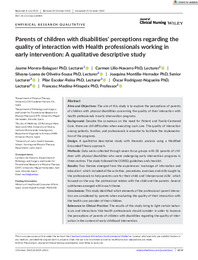Please use this identifier to cite or link to this item:
https://hdl.handle.net/11000/37944Full metadata record
| DC Field | Value | Language |
|---|---|---|
| dc.contributor.author | Morera Balaguer, Jaume | - |
| dc.contributor.author | Lillo-Navarro, Carmen | - |
| dc.contributor.author | Oliveira-Sousa, Silvana Loana | - |
| dc.contributor.author | MONTILLA-HERRADOR, JOAQUINA | - |
| dc.contributor.author | ESCOLAR-REINA, Mª PILAR | - |
| dc.contributor.author | Rodríguez Nogueira, Oscar | - |
| dc.contributor.author | Medina-Mirapeix, Francesc | - |
| dc.contributor.other | Departamentos de la UMH::Patología y Cirugía | es_ES |
| dc.date.accessioned | 2025-11-07T09:06:38Z | - |
| dc.date.available | 2025-11-07T09:06:38Z | - |
| dc.date.created | 2022 | - |
| dc.identifier.citation | Journal of Clinical Nursing. 2023 Sep;32(17-18):6519-6532 | es_ES |
| dc.identifier.isbn | 1365-2702 | - |
| dc.identifier.issn | 0962-1067 | - |
| dc.identifier.uri | https://hdl.handle.net/11000/37944 | - |
| dc.description.abstract | Aims and Objectives: The aim of this study is to explore the perceptions of parents of children with physical disabilities concerning the quality of their interaction with health professionals in early intervention programs. Background: Despite the consensus on the need for Patient and Family-Centered Care, there are still difficulties when executing such care. The quality of interaction among patients, families, and professionals is essential to facilitate the implementation of the programs. Design: A qualitative descriptive study with thematic analysis using a Modified Grounded Theory approach. Methods: Data were collected through seven focus groups with 28 parents of children with physical disabilities who were undergoing early intervention programs in three centres. The study followed the COREQ guidelines and checklist. Results: Two themes emerged from the experiences: ‘exchange of information and education’, which included all the activities, procedures, exercises and skills taught by the professionals to help parents care for their child; and ‘interpersonal skills’, which focused on the way the professional relates with the child and the parents. Several subthemes emerged within each theme. Conclusions: This study identified which elements of the professional-parent interaction are considered by parents when evaluating the quality of their interaction with the health care provider of their children. Relevance to Clinical Practice: The results of this study bring to light certain behaviours and interactions that health professionals should consider in order to improve the perceptions of parents of children with disabilities regarding the quality of interaction in the context of early childhood intervention. | es_ES |
| dc.format | application/pdf | es_ES |
| dc.format.extent | 14 | es_ES |
| dc.language.iso | eng | es_ES |
| dc.publisher | Wiley | es_ES |
| dc.rights | info:eu-repo/semantics/openAccess | es_ES |
| dc.rights | Attribution-NonCommercial-NoDerivatives 4.0 Internacional | * |
| dc.rights.uri | http://creativecommons.org/licenses/by-nc-nd/4.0/ | * |
| dc.subject | children | es_ES |
| dc.subject | disability | es_ES |
| dc.subject | early intervention | es_ES |
| dc.subject | focus groups | es_ES |
| dc.subject | parents | es_ES |
| dc.subject | patient and family-centred care | es_ES |
| dc.subject | professional-patient interaction | es_ES |
| dc.subject | qualitative research | es_ES |
| dc.subject | quality of health care | es_ES |
| dc.subject.other | CDU::6 - Ciencias aplicadas::61 - Medicina | es_ES |
| dc.title | Parents of children with disabilities' perceptions regarding the quality of interaction with Health professionals working in early intervention: A qualitative descriptive study | es_ES |
| dc.type | info:eu-repo/semantics/article | es_ES |
| dc.relation.publisherversion | https://doi.org/10.1111/jocn.16580 | es_ES |

View/Open:
Parents of children with disabilities' perceptions regarding the quality of interaction with Health professionals working in early intervention A qualitative descriptive study.pdf
1,08 MB
Adobe PDF
Share:
.png)
